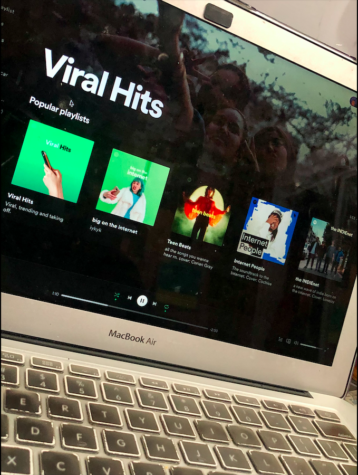Beware Music Listeners: Tiktok is Now Dominating Your Playlists
With TikTok’s rise as a global app, musicians are using the app as a marketing tool in order to increase their streams and to help get their songs on the charts.
TikTok is now available in 154 countries worldwide and in 75 different languages. With over 1 billion monthly active users, the platform is beneficial in helping people to find trending songs and with increasing the popularity of artists globally.
“That song from TikTok is stuck in my head!” is a common phrase many of us have heard over the past few months. A recent, noticeable trend in the music industry is the use of TikTok as a marketing tool in order to increase musicians’ streams. TikTok stars such as Addison Rae and Dixie D’Amelio have used their vast followings on the platform in order to help their songs climb the charts.
Because TikTok is a global app, anyone can make a video and go viral. In the music industry, any singer can become famous overnight by using the right hashtags or participating in popular trends.
For example, Lil Nas X’s song “Old Town Road” went viral on TikTok, hitting millions of streams and breaking the record for the longest sitting number one song on the Billboard Hot 100, launching him into fame.
Singer Doja Cat is another example of this phenomenon. She became a worldwide sensation after her song “Say So” was popularized in a dance trend from late 2019 to early 2020. It was her first top-ten single on the Billboard Hot 100, and the remix featuring Nicki Minaj became her first number one hit in the United States.
With the millions of people using the app, it is not a secret that influencers can use their vast followings to promote music. Many artists hope to take advantage of these influencer fanbases. They pay internet personalities to help make a song trend on the app. Promotional videos are highly profitable, with some influencers earning thousands of dollars per video.
This tactic appears to be successful. A survey that I conducted amongst Bronx Science students found that 75.7% of the students from various grade levels have added a song to their playlist after first hearing it on TikTok.

Influencers are not the only factor that make a song go viral. Sounds on the “For You” page are meant to be engaging which helps increase the track’s streams and success, regardless of the song’s genre, age, or popularity of the artist.
TikTok has allowed for influencers from the app such as Dixie D’Amelio and Addison Rae to make a successful switch from TikTok to a music career. While these songs have landed on the charts, these “music careers” face backlash from the public.
When students were asked if they considered TikTokers who also make music to be true singers, 40.5% said yes, 27% said no, and 32.5% wrote another response. One anonymous student wrote, “If they are just using their success on TikTok to catapult a half-baked music career into the minds of young children who will listen to anything, then they aren’t real singers.”
Another anonymous student wrote, “I think they have to prove themselves… TikTokers shouldn’t be confined to one title or profession but also shouldn’t be considered as something else because of their following on the app.”
The mixed views on whether TikTokers should be considered singers in the industry have struck up debates in the media. But another question arises: How are these TikTokers able to get their songs on the music charts?
Bad publicity is still publicity to these content creators. While some singers use TikTok genuinely to promote their good music, they can be overshadowed by those who are just making music for the check and fame, while gaining publicity from the backlash.
As an anonymous student wrote, “Isn’t that what separates amateur singers and professional singers, whether or not they make money?”
TikTok continues to be used globally to connect people and produce viral songs. With the development of a TikTok radio station on SiriusXM, TikTok continues to be a way for singers to promote their music. Next time someone is listening to a song, it wouldn’t be unusual to think that they might’ve heard it on TikTok first.
“Isn’t that what separates amateur singers and professional singers, whether or not they make money?”
Aaminah Bukhari is a Copy Chief for ‘The Science Survey.’ Her job is to edit her fellow peers’ articles to help them display their full writing potential....

